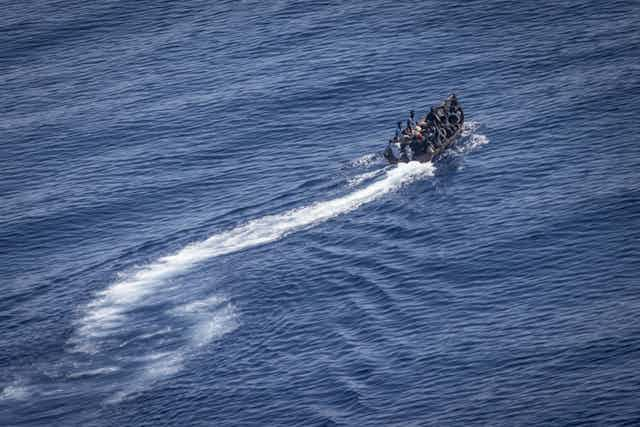On 15 June, the overcrowded fishing trawler Adriana sank on its illicit journey from Libya to Italy, drowning hundreds of men, women and children. In response, states have expressed shock and sadness, and have moved to prosecute smugglers associated with the journey.
Greece, under whose watch the tragedy occurred, declared three days of mourning and arrested nine of the survivors, charging them with human trafficking. In Pakistan, where hundreds of the victims originated, 10 suspected traffickers were arrested.
Some survivor accounts have turned the spotlight on the actions of the Greek coast guard. At one point, its officers attached a rope to the Adriana, possibly with the intention of towing it, and possibly contributing to capsizing it.
I am a scholar with a focus on the development of international law and legal institutions in the practice of transitional justice. My view is that the focus on smugglers, or even the action and inaction of the Greek coast guard, distracts from the real cause of migrant deaths in the Mediterranean: the deliberate policies set in place by European states and supported by the European Union.
Diminishing legal protections for migrants
In the wake of the massive population flows accompanying the second world war, European states enacted the 1951 Refugee Convention. This document obliges state signatories to recognise and protect “refugees” and to grant them social welfare rights on par with citizens. As enacted, this law is quite protective, serving as a legal shield for vulnerable people.
The shield always had holes. For example, not all migrants qualify as refugees, who must face a “well-founded fear of persecution”. This category focuses on political, rather than social, harms; starvation and economic tragedy generally do not qualify.
New holes are appearing. A foundation of the 1951 convention is the state obligations against “refoulement” or pushing refugees back into harm’s way. Long considered as fundamental, this obligation is no longer unassailable. Over the past several years, a pattern of pushbacks has emerged. The Greek coast guard and the EU border agency Frontex have been caught putting migrants out to sea. In May 2022, the director of Frontex resigned after a report showed Frontex was involved in hundreds of illegal pushbacks.
These actions should be understood as symptomatic of state illegality. States have deliberately adopted policies that make refugee movement deadly. For example, states have closed legal land and air routes via visa schemes and stiff penalties for airlines carrying incorrectly documented passengers. This drives migrants towards dangerous crossings.
Individual court cases often recognise state illegality, years after the fact. In December 2022, a court in Rome found the Italian coast guard and navy guilty of manslaughter and negligence in the 2013 death of 268 people in a shipwreck off Lampedusa. The two individual defendants were acquitted, however, because the claims against them were time-barred.
Likewise, a 2012 judgment by the European Court of Human Rights found Italy responsible for human rights violations against migrants committed by the Libyan coast guard. A 2018 filing before that same court alleges ongoing deadly treatment by Italy and Libya. The judgment is still awaited.
Activists have asked the International Criminal Court and the Court of Justice of the European Union to review European treatment of migrants. Yet even if these powerful courts take on these cases, they can only do so much. As long as each case is treated as a potentially prosecutable individual incident rather than as part of an illegal aggregate horror, preventable loss of life will continue.
The Mediterranean is now regarded as the world’s deadliest place for migrants. Since 2014, states have ceased rescue operations in the Mediterranean. States now perform border protection instead. States have also shut down private rescue operations, by impounding boats on trumped up charges and criminally prosecuting NGO workers as human traffickers. As the NGO Médecins Sans Frontières states,
Not only has Europe failed to provide search-and-rescue capacity, it has also actively sabotaged others’ attempts to save lives.
Weakening rule of law
The 1951 Refugee Convention was only one of a series of European rule of law projects designed to recognise and protect human rights following the devastation of the second world war. As I describe in my recent book on international law in Africa, these legal projects took seriously the threat that states pose to individuals, both within and outside their borders, and sought to address this danger by binding states to supranational laws.
This structure – rule of law above the state via an international rule of law system – is the model advocated for African states emerging from colonialism, and for any and all developing states engaging in global politics and commerce.
But European states are renouncing key elements of this rule of law structure via the illegality of their policies towards migrants. European states’ repudiation of legal responsibilities challenges rule of law norms in the international system. This in turn weakens that system as a model for states seeking to normalise rule of law internally.


